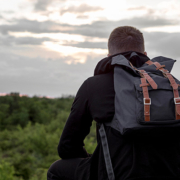And Back Again
Logan Airport. Nineteen-year-old Masterson Peters stood in line at customs, his backpack hanging down his legs as if it was humping him doggy-style. His Dockers t-shirt, which had started out blue, had turned a dingy grey in the last four months, the elaborate anchor logo barely visible any longer.
As he passed weight from one foot to the other, his balance wobbled. The lines were moving so fast. And there was already so much to buy, so many magazines, so many choices of candy bars. Colors, ads everywhere, brightly flashing wants. Polished uniforms and sparkling clean hallways. Sterile counters and covered drinks. Everyone is so big.
He was excited to be home, and simultaneously felt a superiority over all his compatriots who, he supposed, had never seen what he had seen. With wise pity, he watched them. Their fatigue dripped over mobile IVs of caffeine and sugar. Gadgets were wielded and scarves studied like poetry, as bookshelves were searched for portals into success. The shoppers, it seemed to him, lacked any internal mooring, making it impossible to know how much they had. And they looked hungrily for more.
But not Masterson. He hadn’t even needed to check luggage. All he owned had fit in the overhead compartment. One deflated backpack. And it was mostly presents for his family. Not to mention the huge package of pictures he had developed in Nepal. Other than that, just a few T-shirts, a sweater, half a dozen boxers, three pairs of socks, and a change of pants. Some standard toiletries, all proudly replaced (I can actually live this way!) in Katmandu. A camera. He had even given away his Lonely Planet before leaving.
Four months ago, a life-time ago, he had left this airport with so much more than this. It had seemed like nothing at the time.
That initial month. Crossing his first street in Delhi, a barefoot pregnant woman, shoveling tar and pavement, had torn at his clothes and heavy bag. A man with knobs for joints had begged for aspirin, and when refused, had switched to requests for Tylenol. Children had chased him relentlessly, some missing a hand, or a knee doubling backwards, using scrap metal as a cane. Faces, floating within saris and ferreds, had watched him from lives so different from his.
He had become lost in how much he didn’t know. Could never know. His own eyes, his own knowledge, had disintegrated in the pollution to be batted around by honks and chatter. They had all stared back at him in a ravenous, raucous crowd of rickshaws and men, gobbling him up alive, digesting him and shutting him out in an indeterminable splatter, lying a film on the river of railroad tracks, and beading the sweat on the destitute scalp of the man who had agreed to guide him back to his group. He had become lost in more ways than he could ever be found.
What use am I? What can I give? He had wanted to open a vein, a full pulsing neglected vein, and let the starving suck at it, until he was depleted and they were full. Instead, he had slowly parceled out the weight of his bag in a series of presents along his way.
The clothes had been the easiest to pass on. T-shirts and pants found homes easily in the streets of Delhi. He had carried his sweatshirts till they were up in the mountains. A Nepali girl, asking for money, received one, when she explained how cold her mother got at night; she was a pretty and precocious nine-year-old, the mainstay of her family’s welfare, with probably more English than was in her best long-term interest, but for now, she had eyes that saw everything and knew how to strike a stake at a heart’s pocket.
The English books had mostly gone to other travelers, some within his program. The heaviest ones had been given to a sidewalk charity shop, specializing in used books and targeting backpackers.
Masterson hadn’t been convinced it was an actual charity unless the three guys who ran the storefront were the recipients. One night Masterson spotted all three sleeping on a mat on the sidewalk in front of the open shelves.
The walkman, tapes and drawing paper had gone to an adolescent at a monastery, and the jelly beans were unleashed into chaos amongst a pack of tiny beggars. A clinic had tried to compensate him for the medications, and a mother thanked him for the sewing needles, thread, and scissors, but had handed back the first aid kit in confusion.
Feebly trying to unload the weight on his back, he had taken, in return, the knowledge of how much he could do without.
Now, at the airport, he was feeling painfully nostalgic and in love with his common man, forgiving their ignorance and discontent. He remembered feeling the pangs of want before he left, and now he had returned with the knowledge that he had everything he could need. He was gaunt with his first parasite but felt no craving at the sight of the icing-slobbering walnut-stuffed cinnamon monstrosity, an indulgence he had devoured minutes before his out-going flight, sort of a ‘last meal’ before falling off into the unknown. Instead, he met it with curiosity: Why would he want such a thing? Why would he spend time even thinking about it? Rice was enough. Maybe a little dahl. He felt in control of himself, at peace with his desires, clarity, a rising above the thrashing of daily longings, freed from the I-could-really-use-a-cup-of-coffee-when-is-Mom-gonna-get-here, to placidly reflect on the state of mankind.
In all honesty, he felt a bit like Santa Claus; a bag full of gifts and a peacefully patronizing smile. Full of epiphany. This is how I will be for the rest of my life. The birth of my true personality.
He would be the intriguing uncle to his future nieces and nephews, and the guiding hand to his older sisters. His father would pinch his mother with pride over their only son, as he entertained them all with exotic descriptions of yak meat, butter tea, ubiquitous fennel. Tales of adventure and serendipitous discovery. His mother, late at night, over hot chocolate, would admire her son’s sensitivity, as he explained his heartache for the suffering poor and his resolve to do something.
Hugs arrived in the airport, warm, fleshy, and perfumed. The faces seemed foreign with familiarity and spouted, “It’s so good to have you back safe and sound… didn’t you eat anything while you were gone…” A passenger-seat ride through straight lines of snow, glossy roads, orderly traffic lights, rules and etiquette, so so many brand new cars, led to arrival back at the house, a pin in the haystack he had just discovered, and yet warm and tight with memories. He was to hang a youngest child’s ornament on the tree and embrace everyone again.
“Sooo, what was it like?”
“Uh, wanna see?”
He rummaged to the bag’s bottom, reliving the painstaking effort he took to have all these pictures developed and organized so the moment he arrived, when the questions were still hanging in the air, he could show them the beauty he found in the beggars’ open hand, the Nepali girl’s eyes of English dreams, the snake-charmer’s chapped mouth, the baby’s leg wrapping desperately around the swollen belly and hip-bone of his slightly older brother…
“I don’t know Mac. I mean these pictures are kinda a downer.” Cate didn’t want her fiancé’s first Christmas Eve with them spoiled. “Why don’t we put them away for after the holidays?” Starving children and rotting lepers do not a festive holiday make. And besides, it was time for the feast.
“So, there’s no happy people in India, huh,” his eldest sister’s husband said, clapping him on the shoulder as they headed to the kitchen.
Cate related the difficulties of the real estate exam, and Mac felt sick to his stomach. What had he done? He was suddenly a stranger at the table that still held the scars and smudges of his childhood. A double-decade squiggle, etched from a toy batterized pen, still curled under the plate that was now boasting more food for his one person, than would serve a family in India. Half the plate was filled with a slab of roast beef, glistening with melted fat, and still a little-girl pink on the inside. Good-luck lima beans spilled upon the rest of the porcelain; their cheekiness chastised, in one corner, by a whip of potatoes. Against the rim, his mother was heaping his sister’s asparagus casserole into a mountain proudly marking due north. A whole new plate was needed for the bread.
Masterson slouched into his chair, a chair that had once been a comforting harbor and now seemed crowded with jostling distractions.
“Mac, would you like butter for your bread?” his mother asked. When he didn’t answer, she reached over and began slathering his roll as if he was a small child. He snatched it. Her eyes widened as he seriously considered throwing it. At who? What would it change?
Instead, his eyes settled on a stiff bit of butter jutting over a crevice in the bread.
“Thank you, Mom,” he said stiffly, by way of apology. Maybe he meant it. What do I know?
He stuffed the bread in his mouth to keep from saying more.



Leave a Reply
Want to join the discussion?Feel free to contribute!